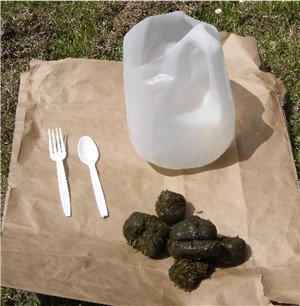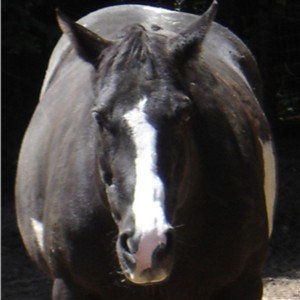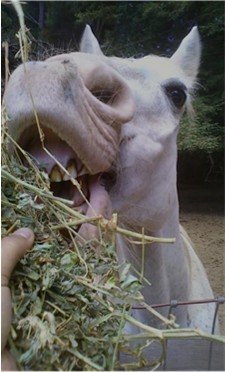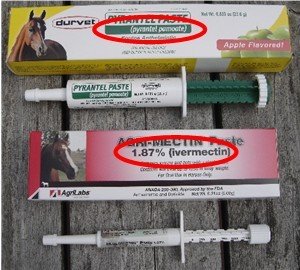Colic in Horses: 7 Common Causes
The Secrets of
Equine Colic and How to Prevent It
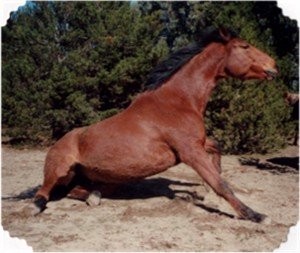
Colic in horses is a term used to describe an equine stomach ache... for horses, this spells big trouble. Horses have a very delicate digestive system. Great care must be taken to avoid potentially deadly disruptions. Unlike humans, horse colic progresses quickly and can be fatal. It is essential that horse owners understand the many causes of colic so they can prevent it from happening to their horse.
Most cases of colic in horses are caused by poor horse management: poor feeding habits, poor exercise and weight management, poor horse worming practices, improper care of a horse's teeth, and even can be caused by improper exposure to water.
Sudden Feed Changes Can Cause Colic
Any sudden feed changes in a horses diet will almost certainly cause a horse to colic. Especially if the horse is exposed to a feed that is richer than the one they have been accustomed to eating. To avoid feed induced colic in horses, always introduce new feeds slowly, over the course of 1½ - 2 weeks.
Examples of Sudden Feed Changes:
- A grass hay fed horse is given alfalfa hay
- A hay fed horse is allowed access to green grass pasture
- A horse that has not been eating grain is offered a large grain portion (see equine food grains to learn about proper portions)
- A grain-fed horse is given an excessive amount of grain (grain overload is an EMERGENCY, seek veterinary care immediately, see equine founder)
- A horse is suddenly exposed to large amounts of any type of new feed; like a horse overeating apples from an apple tree.
- Irregular feeding schedule
Water-Induced Horse Colic
Allowing a horse to drink water immediately after strenuous exercise can cause colic. Horses that are hot and sweaty and finished working should always be cooled down before offering them water. The horse should be allowed to cool down for 30-90 minutes before drinking. Horses can also colic from lack of water. See horse water for more information.
Exercise-Induced Equine Colic
Horses can be thrown into a severe and crippling form of colic from improper exercise practices. A horse that is out of shape and then worked heavily can colic, tie-up, founder or any combination of the three, resulting in permanent chronic lameness or death. This is especially true of horses that are both unconditioned and overweight.
To avoid exercise-induced colic in horses, introduce out-of-shape horses to exercise gradually. Start them out walking. Increase the length of the walks bit by bit, until the horse is ready to begin more robust activity. Always condition a horse for hard workouts before expecting them to perform well under strenuous exercise. This is true for all horses. Even horses that are in exceptional condition can be overworked to the point of failure. Regular exercise and maintaining a good healthy body weight greatly reduces the risk of an exercise-induced colic.
Colic Caused by Poor Dental Care
Colic in horses can be caused by lack of dental care. Horses that are unable to chew their food properly can suffer from impaction colic, where pieces of poorly chewed hay block portions of the intestine. Have your horse's teeth floated regularly when needed to avoid this type of colic.
Sand Colic in Horses
Horses often ingest sand while eating. This can happen when they pull up dirt-filled roots while grazing. It's also common in horses that are fed directly off the bare ground. In "vacuuming" up all the good bits of hay, they end up ingesting a good bit of dirt and sand.
Sand that is allowed to accumulate in the gut can be deadly. The heavy sand settles into a pocket of intestine. As the horse moves around they are at high risk of suffering from a twisted gut.
To prevent sand ingestion feed horses off the ground. Use a sand remover to prevent sand build up.
Parasite-Induced Colic in Horses
Parasites like large strongyles, roundworms and tape worms cause damage to the intestines of horses. Parasites in the larvae stage can block the blood supply to the intestine, thereby killing portions of the gut. Horses that are wormed after a heavy worm infestation can get impaction-type colic from a blockage of dead worms, especially in weanlings. Consult your vet before worming a very young horse for the first time, especially if you suspect a heavy infestation. See horse dewormers to learn more about worming horses.
Colic in Foals
The most common cause of colic in foals is due to intussusception. This is a fancy word to describe one piece of bowel telescoping over another. This requires immediate surgery. Newborn foals can also fail to pass the meconium (first stool in newborns) causing an impaction colic. This can often be solved with an enema and a dose of mineral oil. A vet should always be consulted when dealing with colic in a foal.
Horse colic can be avoided in most instances by good horse care habits. But sometimes accidents happen; a horse gets into an apple orchard, sneaks into the grain barrel or escapes from his pen and pigs out on lush green grass. It is essential that you recognize the signs of colic in horses so you act immediately to avoid death or permanent lameness.
Do you know someone who could use this information? Please share it using the buttons below.
More Equine Colic Related Articles:
Equine > Horse Colic > Colic in Horses

